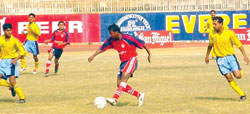|
|
An article in the latest issue of Himal Khabarpatrika asks: If the war-torn African nation Angola could be a contender in this year's World Cup soccer tournament in Germany, why not Nepal?
But what it neglects to mention is how Angola became a contender in the first place. Angolan national football squad members have been playing professionally for clubs in countries such as Kuwait, Spain and the UK. Last year, Angola gathered their talented but internationally scattered players, and fielded a team which played successfully in the qualifying matches. Indeed, to any narrative about their World Cup debut, Angola's war-driven political history serves only as a poignant backdrop. It's the individually skilled players with international exposure who have provided the dazzle to Team Angola.
How can Nepal too aim to produce a team for a World Cup debut? For answers, it's worth suggesting that All Nepal Football Association (ANFA) recast it role to invest resources on three critical priorities.
Hunt for talents: If you visit the ANFA's ill-updated web site, it's clear that the organization's focus is not really on promoting football. There are no photos of players or matches. Nor are there web links to the sites related to the present World Cup. Instead, ANFA's emphases are on spending years on erecting half-finished buildings (hostels, office complexes, etc) and sustaining its own committee-swollen bureaucracy.
That leaves room open for any Nepali football fan to worry that the deeper ANFA sinks into the business of creating infrastructure itself - instead of having it completed within deadlines by third parties- it's going to find it hard to concentrate on its number one priority: Identifying young football talents at grassroots matches all over Nepal. In this context, it helps if ANFA officials think of themselves as talent scouts-and not bureaucrats wasting time on procurement issues and internal quarrels.
Market the talents: To cater to the rising global demand for top football talents, ANFA can adopt a two-pronged strategy: Domestically, it can raise the extent of its partnerships with corporate houses, event management firms, municipalities, youth clubs and schools. Doing so will help it increase the number of local, regional and national tournaments. In this, it should build up on the success of some Nepali clubs that are now being professionally managed and whose players are actually starting to make money from playing football.
Internationally, it's time to develop and deepen relations with Asian, African and European clubs, no matter how daunting such tasks look at the present. Unless our sports leaders see that the road to mastering World Cup-calibre confidence starts from playing with, for and against international clubs and coaches in and out of Nepal, it'll be difficult for our players to gain the physical, technical, tactical and psychological strengths that the game demands in the global arena. After all, scoring goals only at the Dashrat Stadium - sans international exposure - will continue to consign our players to the dustbin of global mediocrity.
Lead the talents: ANFA's core business of promoting football has many interlocking elements. Putting politics and quarrels aside, it needs to start providing credible public leadership on matters related to football. It can do that by reordering its priorities, reaching out to partners, getting the right people on board (instead of old sportsmen who know little about working effectively with differently-skilled professionals), and completing activities one by one.
Doing so consistently well for a number of years will help take Nepal closer to the goal of playing and winning qualifying matches in 2014 and 2018 before, who knows, bringing home the World Cup trophy in 2022-100 years after this beautiful game was first played in this country.




